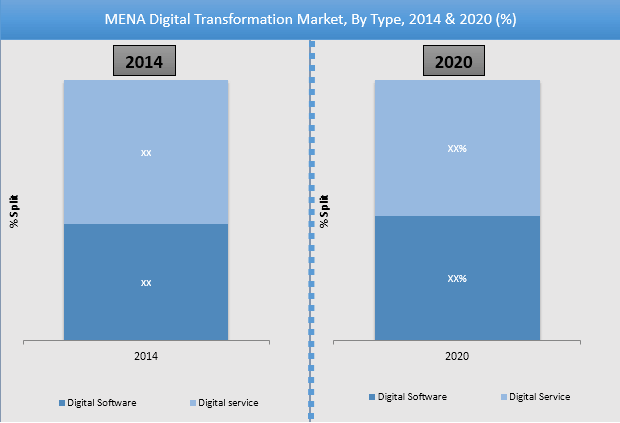
The MENA digital transformation market has registered a staggering growth rate since 2014 and is anticipated to maintain the trajectory, reaching a value off US$ 2.3 Bn by the end of 2020. Burgeoning demand for enhanced customer experience across various levels of customer interaction points, improvised transparency in organizational process across business entities and proliferating e-government and smart city initiatives have been the driving forces behind the market. Digitization has greatly assisted in improving management decisions and extending organizational outreach. Prominent business entities across the MENA region have effectively capitalized on digital integration to improve customer understanding and promoting top-notch growth.
Growing real-time analytics and coalescence of commerce, marketing and sales onto one platform have propelled the demand for digital transformation solutions in the MENA region. Furthermore, the COVID-19 pandemic has added fuel to the fire, evident in the increasing volumes of digital transactions, particularly in the banking, financial services and insurance (BFSI) domain as well as increasing demand for video-on-demand services. Over the past 3-4 months, work-from-home arrangements initiated by business organizations have led to an upsurge in videoconferencing, virtual school and college classes and online transactions, which have significantly bolstered the demand for better access to the internet in the region.
Request a report sample consisting of 87 pages to gain in-depth market insights on https://www.futuremarketinsights.com/reports/sample/rep-ma-39
“Enabling smart technology with a view to enhance organizational flexibility and mobility has accelerated digital transformation across professional settings. These technological enhancements are generating an upswing in business models and value chains. To ensure healthy growth, companies must continue investing in digital transformation and integration and enhance revenue pools,” concludes a prominent FMI analyst.
MENA Digital Transformation Market- Key Takeaways
- A major portion of the MENA digital transformation market revenue was generated in the GCC region. Favorable government legislations permitting the proliferation of e-commerce and e-banking is the principal growth driver.
- Increasing ICT devices penetration such as smartphones, laptops and tablets are providing individuals and corporate houses internet access, allowing for the gestation of the digital transformation market.
- The MENA digital transformation market expanded at a robust CAGR of more than 15% between 2014 and 2020. Growth is expected to surge even further in the future.
- BFSI sector is at the pinnacle, with a share amounting to almost a quarter of the MENA digital transformation market.
Explore the MENA digital transformation market consisting of 51 illustrative figures, 3 data tables and the table of contents. You can also find a detailed market segmentation on https://www.futuremarketinsights.com/askus/rep-ma-39
MENA Digital Transformation Market- Prominent Drivers
- Leniency in government regulations has enabled the procreation of digital transformation solutions across business organizations and individual households in the MENA region.
- The trend of online reading has pushed technology solution providers to design e-newspapers, e-books and e-magazines for various publishing houses, government think-tanks and agencies, thereby boosting growth prospects for the MENA market.
MENA Digital Transformation Market- Key Constraints
- High volatility in technological advancements force companies to direct a huge chunk of their revenue towards procuring these solutions. This proves to be expensive and reduces profit margins.
- Adapting to constant technological changes requires organizations to groom their employees to make effective usage of the same. This leads to substantial expenditure on training programs customized according to employee capabilities.
Anticipated Impact of COVID-19
With shifting global narratives concerning commerce in the wake of COVID-19, organizations are reorienting their priorities on minimizing exposure of their employees, enforcing remote working directives and mandatory social distancing. Naturally, leveraging digital platforms has acquired top priority in these challenging times. Employees have been encouraged to become adept with information technology to conduct daily business activities. With respect to the MENA region, digital transformation solutions have surged massively in the domain of online banking and fintech services. Online payments have reached more than three-quarters of the total market share across all countries while e-commerce is set to reach a valuation of US$ 28.5 billion by 2022. With over three-fifths of the population having access to smartphones, it is no surprise that digital solutions will experience a significant spike in the coming years.
Buy Now Report Here@ https://www.futuremarketinsights.com/checkout/39
The pandemic has ushered in a paradigm shift in the nature of monetary transactions among people. Earlier, people were highly skeptical about utilizing online platforms for completing their transactions due to trust and security issues. However, as the intensity of the pandemic accelerated, people have been compelled to reconsider and challenge their existing belief systems, eventually shifting towards digital platforms. Bahrain, for instance, is a case in point wherein the Gulf nation has been pooling its resources in developing a robust fintech system and augmenting banking expertise. Beginning at very early stages, the country has been able to sustain its economy even in the most trying times. Inspired by its success, other Middle Eastern and North African regions are leaving no stone unturned to incorporate digital finance solutions within their economies.
Competition Landscape
The MENA digital transformation market comprises of the below mentioned market players: Capgemini, Microsoft Corporation, CA Technologies, Accenture PLC, Deloitte, Wipro Limited, IBM Corporation, Hewlett Packard and Oracle Corporation. Investments in cloud computing, data enhancement and engagement with data analytics are some key strategies followed by vendors such as IBM. Furthermore, collaboration with smaller players in order to expand business capabilities is another important strategy followed by the abovementioned players. For instance, IBM Corporation collaborated with WPP, a communications services provider to develop a robust cloud-based digital service infrastructure while Wipro collaborated with Adobe to create integrated analytics, commerce, and marketing and customer experience solutions in 2014.

